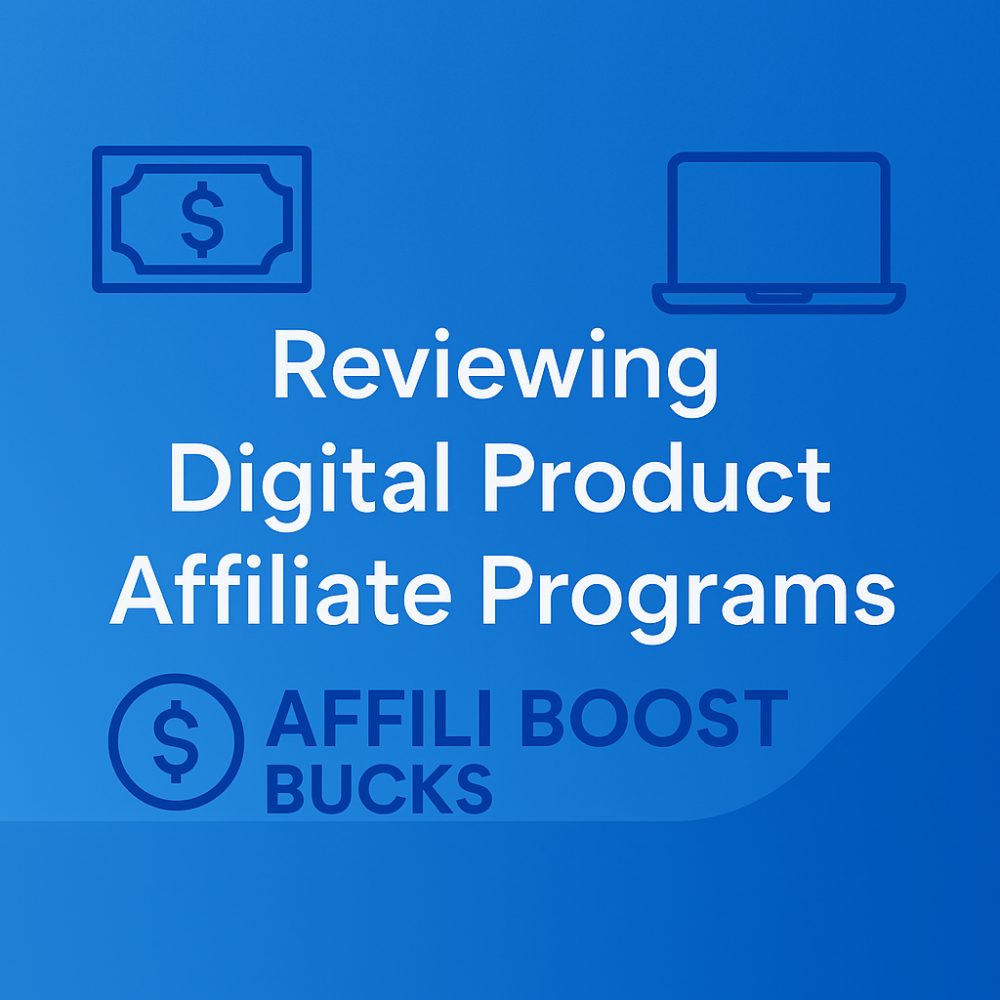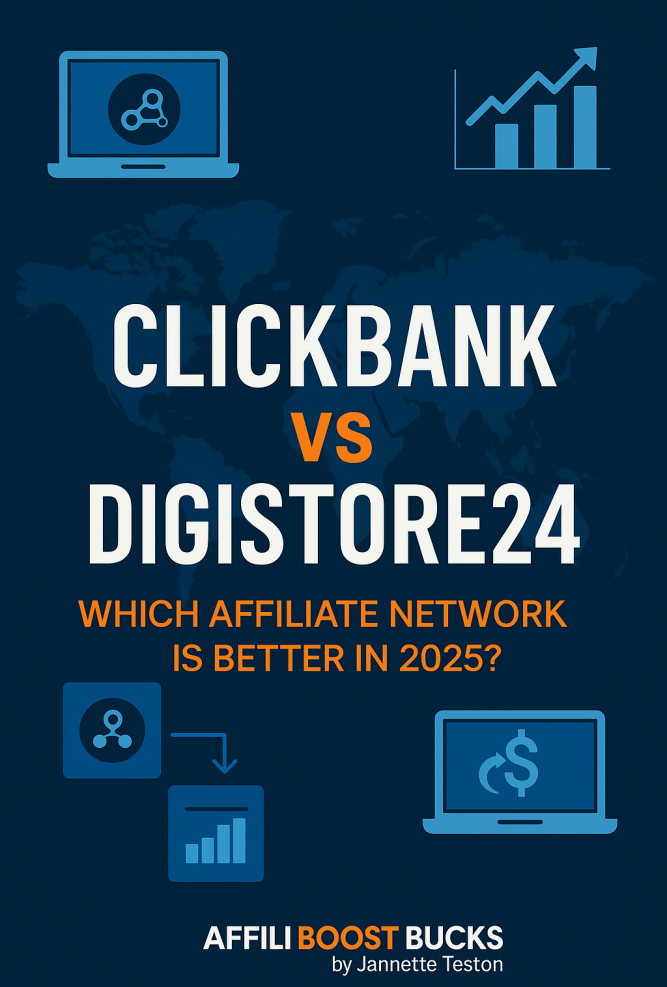Digital product affiliate programs are booming. Whether you’re a blogger, content creator, or online entrepreneur, they offer a scalable, low-risk way to earn income. Unlike physical goods, digital products don’t require manufacturing, inventory, or shipping. That means higher commissions, faster delivery, and global access—all key reasons why digital affiliate marketing has become a go-to model for monetization.

In this guide, we’re reviewing affiliate programs in the digital space—what they offer, how they differ, and what to look out for. Whether you’re just starting out or want to expand your portfolio, this post breaks it down in practical terms, no fluff.
Why Digital Products Make Great Affiliate Offers
Before we dive into individual programs, let’s get clear on why digital products are uniquely valuable in affiliate marketing.
1. Higher Profit Margins = Higher Commissions
Most physical product affiliate programs offer 1-10% commission rates. Digital products? You’re looking at 30%, 50%, sometimes even 75% or more. Why? Because there’s no cost to reproduce a digital download or subscription. That margin goes to the creator and to you, the affiliate.
2. Instant Access = Satisfied Buyers
With digital products, buyers get what they want immediately. No delays, no shipping issues, no damaged goods. That makes for happy customers—and fewer refund headaches for you.
3. Evergreen or Recurring Revenue
Many digital product affiliate programs offer recurring commissions, especially in niches like software or memberships. Refer someone once and get paid monthly for as long as they stay subscribed. That’s passive income in its purest form.
4. Global Reach
Digital products aren’t bound by geography. You can promote an online course, eBook, or app to anyone with an internet connection. Your audience isn’t just national—it’s worldwide.
How to Evaluate a Digital Product Affiliate Program
Now that you see the upside, the next step is reviewing affiliate programs critically. Not all are worth your time. Here’s how to assess whether a digital affiliate offer is worth promoting.
1. Commission Structure
What do you earn per sale? Are commissions one-time or recurring? Does the program offer bonuses or tiers? Higher numbers aren’t always better—some high-paying products have low conversion rates. Make sure the payout justifies your effort.
2. Conversion Quality
Is the product landing page optimized? Is the sales copy persuasive? Do they use email marketing, free trials, or demos to help convert your traffic? Test the funnel yourself. If you wouldn’t buy it, don’t promote it.
3. Cookie Duration
How long is the tracking cookie valid? Some programs offer 7 days; others go up to 90 or even lifetime cookies. A longer duration gives you a better shot at earning credit for referred sales.
4. Payout Terms
How and when do you get paid? Monthly? After reaching a threshold? Is it via PayPal, direct deposit, or gift cards? Transparent terms and reliable payment history are non-negotiable.
5. Product Reputation
Promoting a sketchy or low-quality digital product is a quick way to lose audience trust. Look for products with strong reviews, testimonials, and social proof. Better yet, use them yourself.
Top Digital Product Affiliate Programs to Consider
Let’s get specific. Below are some of the strongest digital product affiliate programs across different niches—from software to online education.
1. ClickBank
Best For: Broad variety of niches
ClickBank is one of the oldest and largest marketplaces for digital products. From fitness ebooks to business coaching to crypto courses, it has thousands of offers.
- Commission Rate: Up to 75%
- Cookie Duration: 60 days
- Pros: Easy to sign up, no approval needed, high payouts
- Cons: Quality varies—some products are spammy or outdated
Verdict: Great for beginners, but you need to research products carefully.
2. PartnerStack
Best For: SaaS products
PartnerStack is a B2B-focused platform connecting affiliates with software companies like FreshBooks, Notion, and Unbounce.
- Commission Rate: Typically, 20-50% recurring
- Cookie Duration: Varies by program (30–90 days)
- Pros: High retention = long-term recurring income
- Cons: Not ideal for B2C or casual audiences
Verdict: Excellent if your audience includes small businesses, startups, or freelancers.
3. Gumroad Affiliates
Best For: Niche creators and indie products
Gumroad lets creators sell everything from templates to courses to music. If you promote creators you already follow, their affiliate program is a natural fit.
- Commission Rate: Set by product creator (typically 10–50%)
- Cookie Duration: 30 days
- Pros: Diverse products, easy integration
- Cons: Small commissions if product prices are low
Verdict: Great for niche content creators or micro-audiences.
4. Teachable Partner Program
Best For: Online education and courses
Teachable hosts thousands of online courses on business, writing, fitness, and more. Their affiliate program lets you earn by referring people to create or purchase courses.
- Commission Rate: 30% recurring for creator referrals
- Cookie Duration: 90 days
- Pros: High-ticket courses = high payouts
- Cons: Competitive niche
Verdict: Strong for education-focused content or YouTube channels.
5. AppSumo Affiliate Program
Best For: App deals and lifetime software offers
AppSumo specializes in limited-time deals on digital tools for solopreneurs and small businesses. It’s a trusted platform with a loyal following.
- Commission Rate: 100% of first purchase (up to $50) or 30% recurring
- Cookie Duration: 90 days
- Pros: Viral deals, high engagement, easy upsells
- Cons: Not evergreen—deals change weekly
Verdict: Great for newsletter creators or tech-focused content.
Niches Where Digital Affiliate Marketing Thrives
If you’re still figuring out what kind of digital products to promote, here are some niches where digital affiliate marketing consistently performs well:
1. Online Education
Courses, coaching, bootcamps—education is a goldmine. From marketing to productivity to design, there’s a digital course for every interest.
2. SaaS (Software as a Service)
Apps like email marketing platforms, CRMs, invoicing tools, and design tools often pay recurring commissions and are used long-term.
3. Finance & Investing
Digital products in this space include trading platforms, budgeting apps, crypto education, and financial planning tools.
4. Health & Fitness
Meal plans, workout programs, meditation apps, and wellness coaching all work well with digital delivery.
5. Digital Creator Tools
Think templates, fonts, stock media, or course platforms—any product that helps creators produce or sell more online.
How to Succeed With Digital Product Reviews
Promoting digital products isn’t just about dropping a link and hoping for clicks. Your digital product reviews need to build trust and provide real value. Here’s how to do it right.
1. Actually Use the Product
First-hand experience translates into authentic, compelling content. Your review will carry more weight when readers know you’ve used what you’re recommending.
2. Be Honest
Don’t overhype the product. Share both pros and cons. A balanced review builds credibility and keeps your audience coming back.
3. Include Visuals
Screenshots, video demos, and walkthroughs make your review more engaging—and improve conversions. People want to see what they’re buying.
4. Focus on Benefits
Don’t just list features. Explain how the product solves problems. How much time will it save? What can the buyer achieve with it?
5. Compare Alternatives
If there are competing tools, do a comparison post. These perform well in search and help readers make informed decisions.
Red Flags to Avoid in Digital Affiliate Programs
Not every program is legit. Watch out for:
- Poor Refund Policies: High refund rates = lost commissions.
- Low EPC (Earnings Per Click): Indicates poor conversion or poor product fit.
- Hard to Reach Support: If you can’t get help, that’s a bad sign.
- Pushy MLM-style Upsells: Avoid programs that pressure buyers or affiliates into buying tiers or packages.
Remember: your reputation is your most valuable asset. Only promote what you truly believe in.
Final Thoughts
Reviewing digital product affiliate programs isn’t just about finding what pays the most. It’s about alignment—between your audience, your values, and the product itself. Choose programs that make sense for your niche, offer real value to your readers, and fit your content style.
With digital affiliate marketing, the opportunities are massive—but so is the competition. The affiliates who win don’t just push links; they educate, compare, test, and recommend with honesty and precision. Focus on quality over quantity, and the revenue will follow.
Key Takeaways
- Digital product affiliate programs offer high commissions, low friction, and global scalability.
- Evaluate affiliate programs based on payout, conversion quality, product quality, and support.
- Use trusted platforms like ClickBank, PartnerStack, Teachable, and AppSumo to find offers.
- Create honest, engaging digital product reviews to drive real conversions.
- Avoid shady programs that put your credibility at risk.
Affiliate marketing isn’t dead—it’s just smarter now. And when it comes to digital products, the smart money is on transparency, relevance, and real value.

